- Have any questions?
- +880-1832219025
- englishrajib877@gmail.com
Essential Grammar for IELTS Writing Task
Spoken English-Telephone Conversations
March 6, 2021
Spoken English for Kids(2024)
March 19, 2021Essential Grammar for IELTS Writing Task
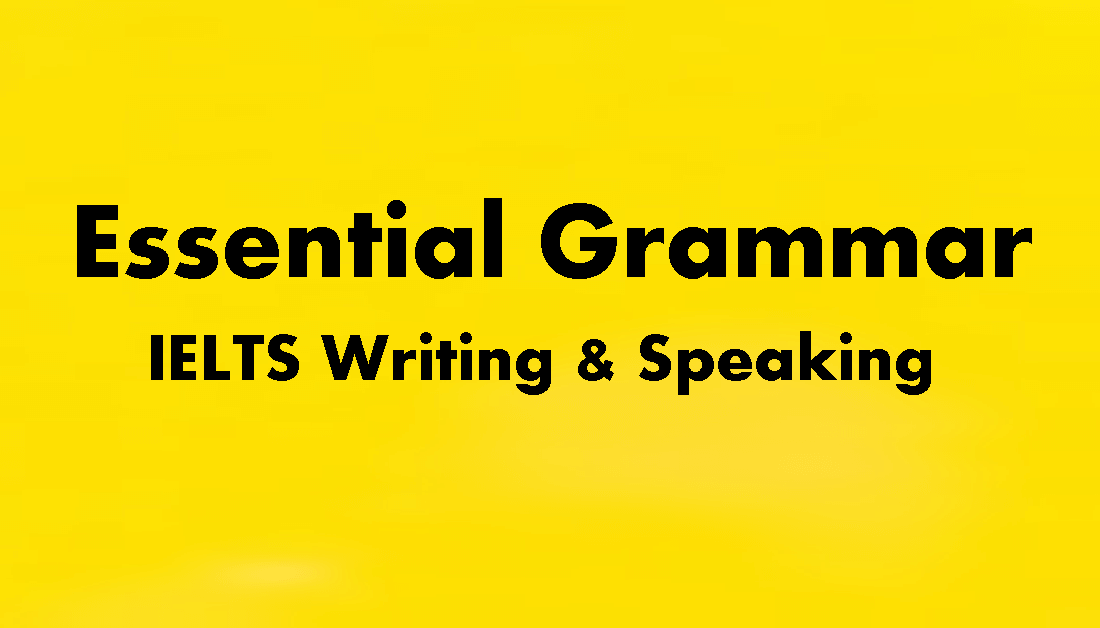
Essential Grammar for IELTS Writing Task
Tense in details
Present Indefinite Tense:
কোন কাজ বর্তমানে হয় বোঝালে বা অভ্যাসগত সত্য বোঝালে বা চিরসত্য বোঝালে Present Indefinite Tense হয়।
Structure:
Subject + Main Verb + Object.
Subject third person singular number (he, she, it, কোন ব্যক্তি, বস্তু, জায়গা বা প্রাণীর নাম) বোঝালে verb এর শেষে s বা es বসে।
Example:
আমি স্কুলে যাই – I go to school.
সে প্রতিদিন স্কুলে যায় – He goes to school every day.
অনুগ্রহ করে প্রথম থেকে শেষ পর্যন্ত পড়ুন। আপনি 100% উপকৃত হবেন
Present Continious Tense:
বর্তমানে কোন কাজ চলছে বা নিকট ভবিষ্যতে চলবে এরূপ বোঝালে present continuous tense হয়।
Structure:
Subject + be verb (number ও person অনুযায়ী বসবে) + verb + ing + object.
I এর পর am বসবে। He, She, it এবং অন্যসব third person singular number এর পর is বসবে। We, you, they এবং Plural subject এর শেষে are বসে।
Example:
আমি ভাত খাইতেছি – I am eating rice.
সে স্কুলে যাইতেছে – He is going to school.
Present Perfect Tense:
কোন কাজ শেষ হয়েছে অথচ তার ফল এখনও বর্তমান আছে (অপ্রকাশিত), এরূপ বোঝালে Present perfect tense হয়।
Structure:
Subject + have/has + past participle + object.
Subject third person singular number (he, she, it কোন ব্যক্তি, বস্তু, জায়গা বা প্রাণীর নাম) বোঝালে has বসবে । I, we, you, they এবং অন্যসব plural subject এর শেষে have বসবে।
Example:
আমি ভাত খাইয়াছি – I have eaten rice.
সে স্কুলে গিয়েছি – He has gone to school.
Past Indefinite Tense:
অতীত কালের কোন কাজ বোঝাতে বা অতীতের কোন অভ্যাস বোঝাতে, যার ফল এখন আর বিদ্যমান নেই তাকে Past Indefinite Tense বলে।
Structure:
Subject + past form of main verb + object.
Example:
আমি ভাত খাইয়াছিলাম/খেয়েছিলাম – I ate rice.
আমি স্কুলে গেছিলাম/গিয়েছিলাম – I went to school.
Past Continuous Tense:
অতীতকালে কোন কাজ কিছুক্ষণ ধরে চলছিল এরূপ বোঝালে Past continuous tense হয়।
Structure:
Subject + was/were + main verb + ing + object.
subject first person and third person singular number হলে was বসবে। we, you, they এবং অন্যান্য plural number এর শেষে were বসবে।
Example:
আমি ভাত খাইতেছিলাম/খাচ্ছিলাম – I was eating rice.
সে স্কুলে যাইতেছিল/যাচ্ছিল – He was going to school.
তারা ফুটবল খেলিতেছিল/খেলছিল – They were playing football.
Future Indefinite Tense:
ভবিষ্যতে কোন কাজ ঘটবে এরূপ বোঝালে Future indefinite tense হয়।
Structure:
Subject + shall/will + verb + object
সাধারনত 1st person এর পর shall বসতে পারে। এছাড়া অন্য সব ক্ষেত্রে will বসে।
Example:
আমি কাজটি করিব- I will/shall do the work.
তারা কাজটি করিবে- They will/shall do the work.
Active voice:
যে sentence-এ subject নিজে সক্রিয়ভাবে কাজটি করে সেই sentence-এ verb-এর active voice হয়।
Sentence Structure:
Subject + Verb + Object
Example:
- I write articles.
Passive voice:
যে sentence-এ subject নিজে সক্রিয়ভাবে কাজটি করে না বরং object-এর কাজটি তার দ্বারা করা হয় সেই sentence-এ verb-এর passive voice হয়।
Sentence Structure:
Object + be verb+ verb’s past participle + by+ subject
Example:
- Articles are written by me.
Voice-কে active থেকে passive করার নিয়মগুলো নিচে বর্ণিত হল:
Rule 1:
a. Active voice-এর subject passive voice-এর object-এ রূপান্তরিত হয়।
The active voice’s subject is changed to the passive voice’s object.
b. Active voice-এর object passive voice-এর subject-এ রূপান্তরিত হয়।
The active voice’s object is changed to the passive voice’s subject.
c. মূল verb-এর past participle ব্যবহৃত হয় এবং auxiliary verb/ be verb নির্বাচন করা হয় subject এবং tense অনুযায়ী ।
The main verb’s past participle is used, and the auxiliary verb/ be verb is chosen according to subject and tense.
Example:
- I write poems. (Active)
- Poems are written by me. (Passive)
Tense changes verb in Voice
Present indefinite tense ——–am/is/are
Present continuous tense ———am being/is being/are being
Present perfect tense———have been /has been
Past indefinite tense ——–was/were
Past continuous tense ——was being/were being
Past perfect tense ———–had been
Future indefinite tense ——shall be/will be
Modal auxiliary verb যুক্ত(May/might/can/could/must/ought to/need to/dare to/should/would/going to +verb) যুক্ত Sentence কে active থেকে passive করার সময় সব কিছু (rule 1) এর মত হবে শুধু যে Modal auxiliary verb টি থাকবে তা সরাসরি বসবে এবং তারপর be বসবে।এ ক্ষেত্রে tense অনুযায়ী auxiliary verb বসবে না।
Structure :
Object এর subject + may, might, can, could, must, ought to, need, dare, should, would, going to এর পরে be + v3+ by + subject এর object.
Active: Toha may help you.
Passive: You may be helped by Toha.
Active: we are going to open a canteen.
Passive: A canteen is going to be opened by us.
Conditional Sentence Structure
The First Conditional:
First Conditional এ সাধারণত ‘if’-এর পরে একটি present simple tense এবং তারপর একটি future simple clause থাকে। এই রকম conditional সাধারণত ভবিষ্যতে হতে পারে এমনকিছু বোঝাতে ব্যবহৃত হয় কিন্তু পুরোপুরি নিশ্চিত নয়। এটা সম্ভাব্য ঘটনা বর্ণনা করে।
Structure:
if + present simple, ……..will + infinitive
Example:
If it rains today, I’ll not go to the market.
The Second Conditional:
After ‘if’ it uses the simple past tense, and then ‘would’ and the infinitive.
Second Conditional এ ‘if’-এর পর past simple tense ব্যবহার করা হয় এবং তারপর ‘would’ এবং infinitive ব্যবহার করা হয়।
Structure:
if + past simple, ……..would + infinitive
Example:
If I won the lottery, I would help the poor.
The Third Conditional:
Third Conditional এ ‘if’-এর পর past perfect tense এবং তারপর ‘would have’ এবং sentence-এর দ্বিতীয় অংশে past participle ব্যবহার করে।
After ‘if’ it uses the past perfect tense, and then ‘would have’ and the past participle in the second part of the sentence.
Structure:
if + past perfect, ……..would + have + past participle
It talks about the past and describes a situation that didn’t happen, and imagine the result of the situation.
Third Conditional সাধারণত অতীত সম্পর্কে কথা বলে এবং এমন একটি ঘটনা বর্ণনা করে যা ঘটেনি এবং ঘটনাটির ফলাফল কল্পনা করে।
Example:
If I had been in your position, I would not have gone there.
Gerund sentence structure
Verb এর present form এর সাথে ing যুক্ত হয়ে Gerund, Noun ও Verb এর কাজ একসাথে সম্পন্ন করে। Gerund এর বৈশিষ্ট্য হচ্ছে এটি স্থির অবস্থা প্রকাশ করবে এবং আচরণ করবে noun এর মতো।
উদাহরণঃ
✪ Swimming is a good exercise.
✪ He started watching television.
Participle sentence structure
Participle এর বৈশিষ্ট্য হচ্ছে এটি চলমান অবস্থা প্রকাশ করবে এবং আচরণ করবে adjective এর মতো। যেমনঃ I saw a walking boy. (আমি একজন বালককে হাটতে দেখেছিলাম) এই বাক্যটি চলমান অবস্থা প্রকাশ পেয়েছে কারণ এখানে কেউ হাটে, তাই Walking শব্দটি Participle এবং আচরণ করে adjective এর মতো।
Types of participle
Participle ৩ প্রকার।
1. Present Participle
2. Past Participle
3. Perfect Participle
Structure of Participle
✪ Present Participle = V1 + ing
✪ Past Participle = V3
✪ Perfect Participle = Having + V3
(Example: Having learned Computer I will go to America)
Infinitive sentence structure
Verb এর Present form এর পূর্বে to বসিয়ে Infinitive গঠন করা হয়। Tense, number, person অনুযায়ী এর কোন পরিবর্তন হয় না।
Example :
To tell a lie is a great sin.
I like to run.
শর্টকাট টিপস্
Gerund & participle
Gerund = V1+ing (স্থির অবস্থা প্রকাশ করবে এবং আচরণ করবে noun এর মতো)
Participle = V1+ing (চলমান অবস্থা প্রকাশ করবে এবং আচরণ করবে adjective এর মতো)
Simple, Complex and Compund sentence
Simple sentence: যে Sentence এ একটি মাত্র Subject এবং একটি মাত্র finite verb (সমাপিকা ক্রিয়া ) থাকে, তাকে Simple sentence বলে। এ ছাড়া Simple sentence, Inspite of, Because of, Being ইত্যাদির সাহায্যে গঠিত হয়।
Example:
My teacher teaches me English. – আমার শিক্ষক আমাকে ইংরেজি শেখান।
Going there, I found him. – সেখানে গিয়ে তাকে পেলাম।
I want to write a letter. – আমি একটি চিঠি লিখতে চাই।
Walking is good for health. – হাঁটা স্বাস্থ্যের জন্য ভালো।
Complex sentence: যে Sentence এ একটি মাত্র principal clause এবং এক বা একাধিক subordinate clause থাকে, তাকে Complex sentence বলে। Complex sentence এ Subordinate clause টি সাধারণত subordinating conjunctions ( though, although, till, until, before, which, what, when, who, whom, after, unless, since, if, as, because, that) ইত্যাদি দ্বারা শুরু হয়।
Example:
I know where he lives. – আমি জানি সে কোথায় থাকে।
I will go if he comes. – সে এলে আমি যাব।
I know the time when he will come. – আমি জানি সে কখন আসবে।
You need not go since you are ill. – তুমি অসুস্থ থাকায় তোমাকে যেতে হবে না।
Compound sentence: যে sentence এ দুই বা ততোধিক Principal clause থাকে এবং clause গুলো coordinating conjunctions (For, And, Nor, But, Or, Yet, So) দ্বারা যুক্ত থাকে, তাকে Compound sentence বলে। coordinating conjunctions গুলো ‘fanboys’ শব্দ দ্বারা মনে রাখা সহজ।
Example:
He is rich but his brother is poor. – সে ধনী কিন্তু তার ভাই গরীব।
I went there and found him. – আমি সেখানে গেলাম এবং তাকে খুঁজে পেলাম।
He is poor but he is honest. – সে গরীব কিন্তু সে সৎ।
The army invaded the city, destroyed all the houses and killed many men. – সেনাবাহিনী শহর আক্রমণ করলো, সমস্ত বাড়িঘর ধ্বংস করলো এবং বহু পুরুষকে হত্যা করলো।
Bring your book and open at page 20. – তোমার বইটি আন এবং কুড়ি নম্বর পৃষ্ঠা খোলো।

Adverbial Clause
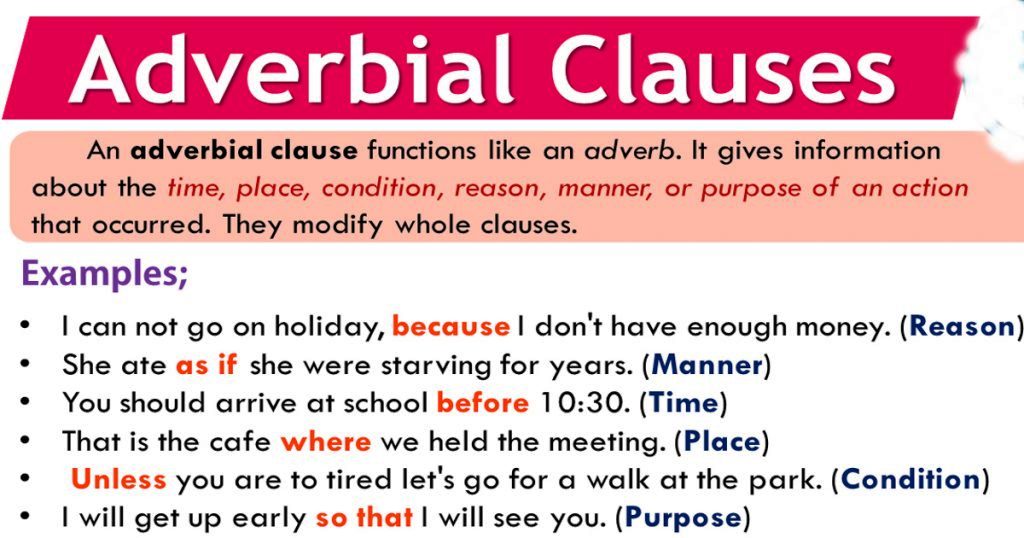
Relative Clause
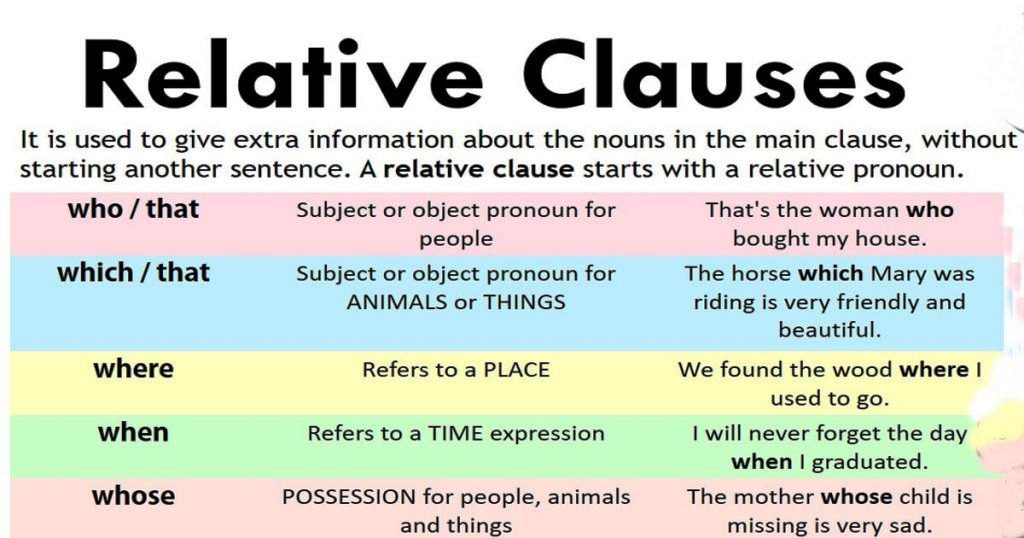
Noun Clause
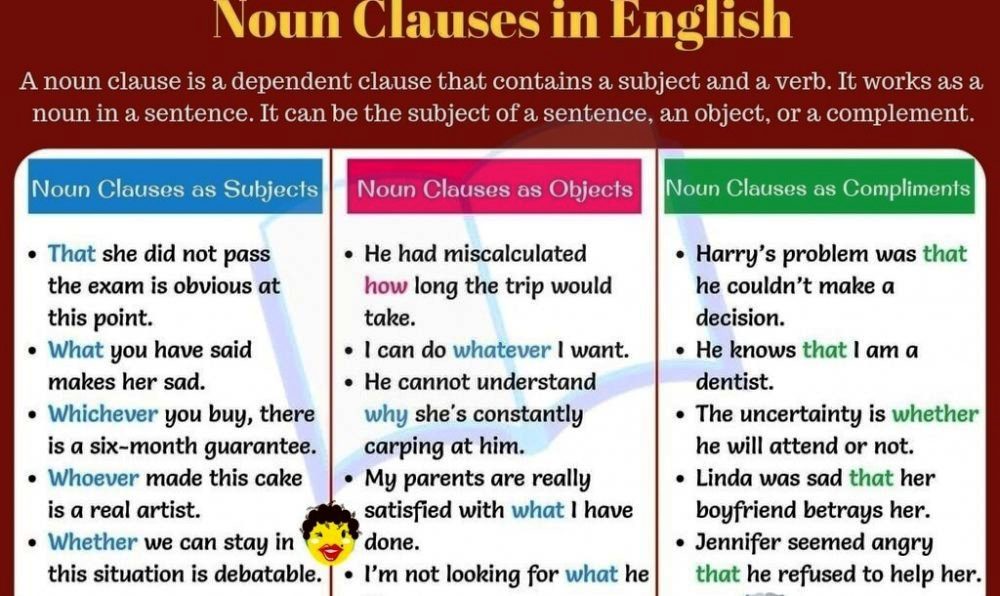
Usage of Connectors
Connects Similar Ideas: and, again, also, besides, further, moreover, similarly, in addition, firstly, secondly finally, additionally, the last but not the least
Connects Opposite Ideas: But, However, In contrast, By contrast, On the contrary, On the other hand, Nevertheless
Connects Casual Relationship: as, as a result, because, accordingly, for, hence, since, so, so that, thus, therefore.
Other Variables: Never, Not only—-but also, Either, Parallel Structure
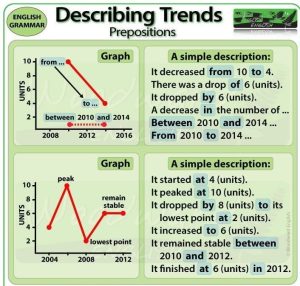
Lexical Resource: Avoid Redundancies
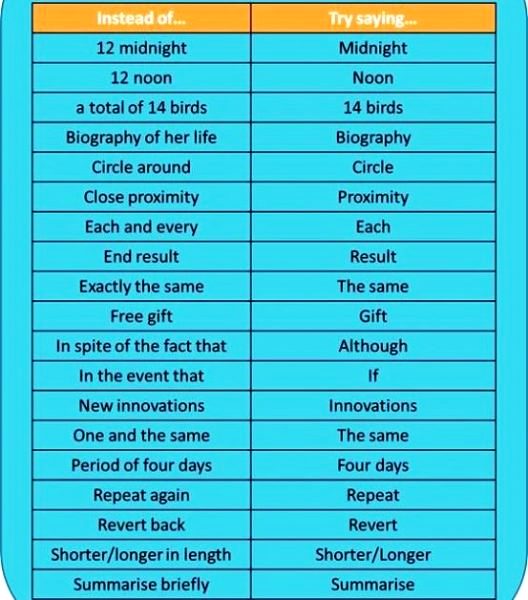
IELTS Writing Task-2 Sample
Model Question: Some People Think That Art Is An Essential Subject For Children At School While Others Think It Is A Waste Of Time
Model Answer:
At present society is polarized into two groups almost equally regarding the notion of whether art subjects are vital or not crucial for children. Different persons have different mindsets. The following essay would shed light on both approaches before making a final note.
To commence with the first notion, there are myriads of things to be shared in its favor. First and foremost, the study of art subjects benefits students both academically and mentally. Such as, art is a subject by which learners can express their latent talent. No one can say whose skills are hidden where. That’s why I personally believe that arts subjects are necessary for children at school. Furthermore, education is not solely fulfilled by reading practical and job-oriented subjects. Students can also learn a lot by studying art subjects. Art can bring out a person’s creativity and capability. For instance, we can learn about our history, traditions, and culture through movies, songs, and paintings created by artists. In addition, arts subjects play a vital role in our day-to-day life. Besides this, arts is a major form of our cultural abundance.
On the other hand, some people think that studying these subjects is a waste of money and killing our valuable time. In the present competitive world of globalization, everybody desires a luxurious and comfortable life for which they only hanker after studying those subjects through which they can earn more money and social status as everything has become money-oriented. Though the study of arts subjects makes people’s lives illuminated and enlightened yet, most people like to study those job-oriented subjects instead of arts subjects so that they can ensure a better job with a higher salary to make their life secure. As a result, a group of people think that these art subjects are not vital for children yet they have a profound impact on the mental enrichment of the children.
To sum up, having discussed the statement, I would like to say art subjects are needed for every child at school.



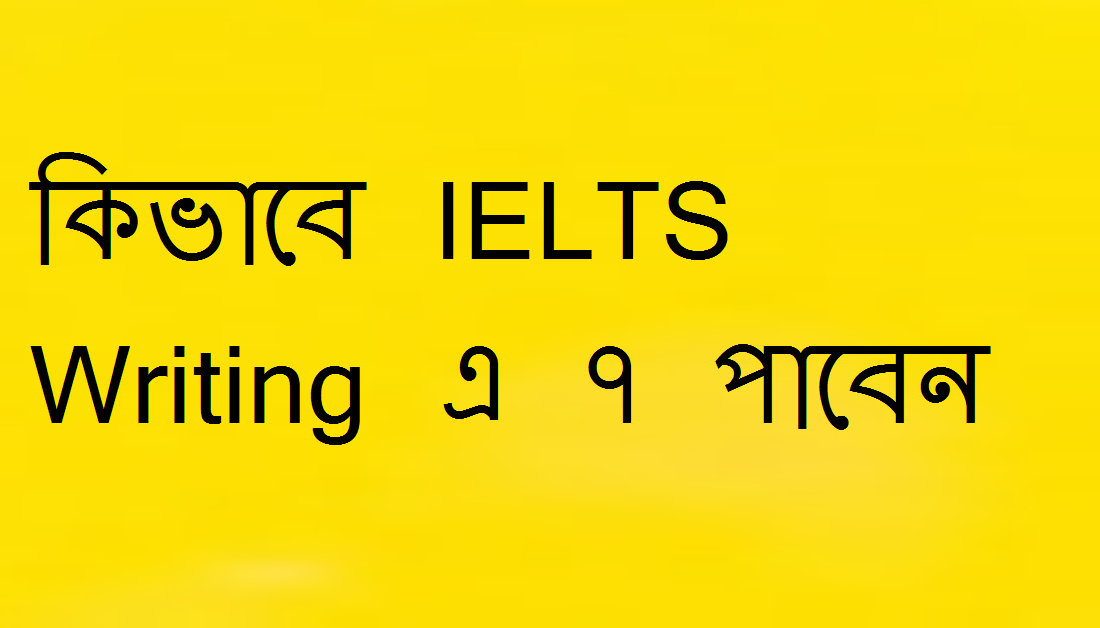
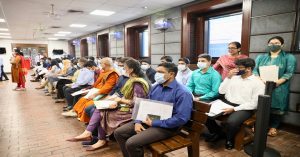
8 Comments
Dream IETS
Dear Rahman, Thanks a lot for your appreciation. Keep going and make your dream come true. Wish you all the best.
Good
Thanks a lot for your appreciation!
Its very nice.
Thanks a lot for your appreciation!
Keep it up, sir
Thanks a lot for your appreciation!